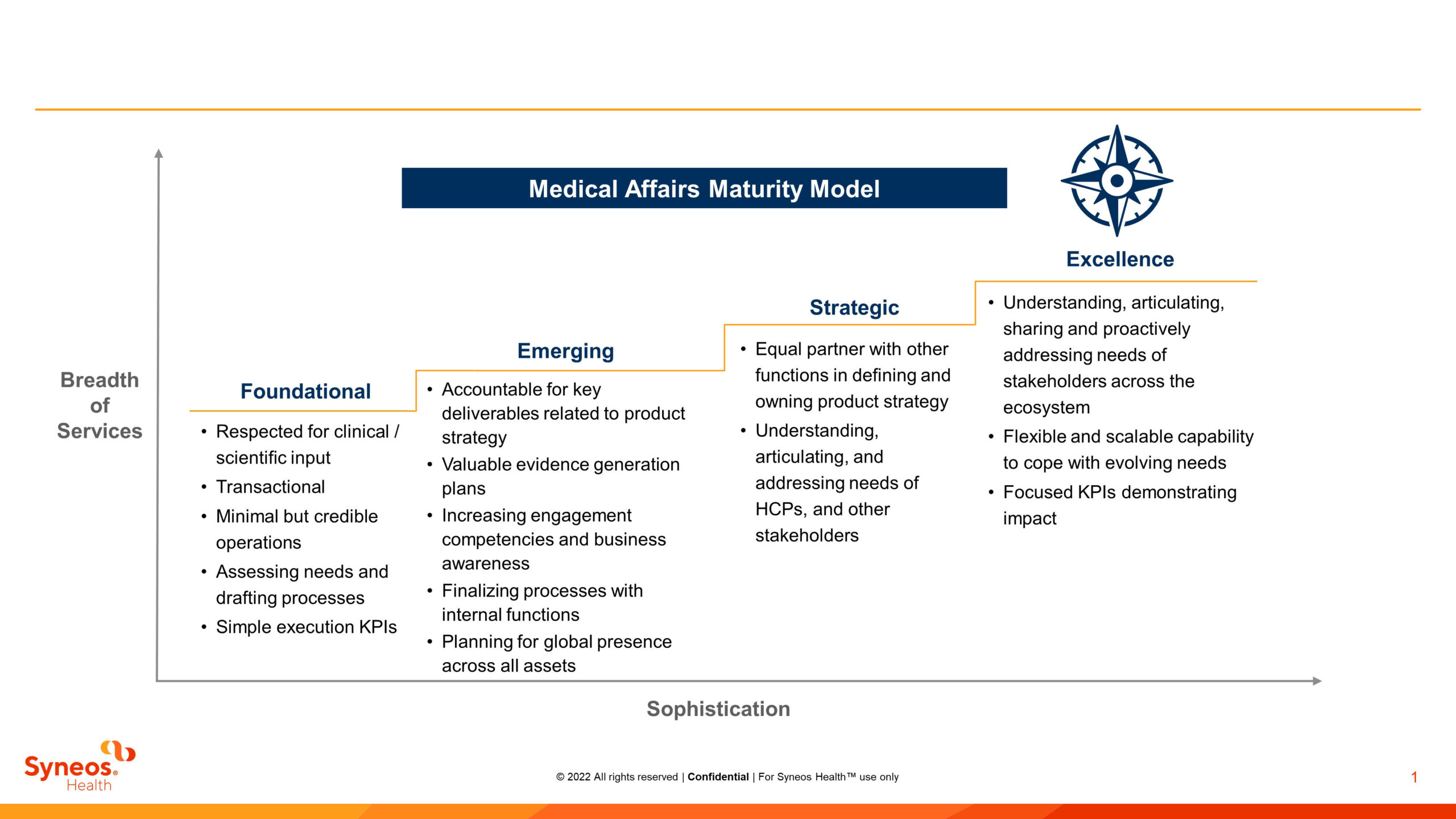In our last article, “Advancing Medical Affairs to be a Value-based Strategic Partner” (PM360, May 2022) we discussed how Medical Affairs needs to adapt with the changing healthcare landscape. In an external environment that is trending towards increased complexity and is defined by diverse stakeholders and their unique engagement needs, Medical Affairs needs to consider increasing its overall functional agility and visibility within the broader organization. Pushing to establish dedicated C-suite leadership, adopting a flexible resourcing model, and clearly demonstrating its positive impact through data and analytics should be key priorities for organizations.
Now is also the time for leaders to start thinking broadly about how to transform the function from a traditionally supporting role to one that is truly a strategic thought partner. Evolving the role of the function does not have to be achieved by building capabilities from the ground up, as traditional thinking would dictate. Instead, by adopting a shift in mindset, leadership can identify foundational pillars to serve as a blueprint for the next generation of Medical Affairs and reposition existing organizational and functional capabilities to build that foundation.
Challenging the Status Quo
Medical Affairs leaders need to be open to challenging the status quo and create a function that can operate proactively and independently rather than being in a supporting role (Figure 1). When designing or evolving Medical Affairs as a strategic pillar, several critical factors must be considered from an organizational, capability, and personnel perspective. Organizationally, it is important to consider how the function will operate within a broader cross-functional ecosystem and what critical sub-functions will be included under its overall purview. From a capability perspective, it is critical to define what value creation areas belong to Medical Affairs in a lead capacity, and where it needs to contribute to cross-functional teams to demonstrate value in this complex landscape where resources (economic or personnel) are carefully planned for optimal return on investment. Finally, it is important to understand the core competencies, skills, and behaviors that all talent should possess to drive value within the evolved and agile Medical Affairs operating model.
An overall change in mindset should be a defining quality for Medical Affairs leaders overseeing this transformation; leadership needs to focus on being innovative, agile, and resilient to properly adapt as the healthcare ecosystem evolves to meet new demands of diverse stakeholder groups. They need to be flexible to align with broader organizational strategic goals and introduce new ways of working. Ultimately, Medical Affairs leaders need to serve as effective change ambassadors by instilling and properly shepherding a cultural shift to lead their team members to drive cross-functional engagement and mitigate miscommunication resulting from the silo effect that is present in organizations today.
Capability-Centric Approach to Address Medical Affairs Transformation
Adopting an innovative mindset also helps free leaders from constraints of legacy thinking around functional design and the traditional go-it-alone mentality. Rather, Medical Affairs leaders need to look from within the organization and identify existing capabilities from various functions to adapt a solid foundation for a value-based, strategic Medical Affairs that promotes cross-functional engagement.
Research shows that business leaders across diverse industries recognize the importance of such cross-functional teaming and flexibility to optimize talent and ensure alignment within their organizations.1 This is an indicator for leaders to realize the need to explore new ways of thinking to operate differently without the limitations of the traditional model.
For instance, a capability-centric model can instill an innovative mindset within companies as they seek to evolve their Medical Affairs operations. Companies should assess their Medical Affairs capabilities comprehensively and systematically to design and deliver against key value drivers for the organization at large.
Case Study: Centralized Medical Affairs Model—Leveraging Existing Capabilities as Fit-for-Purpose
As we alluded to previously, core Medical Affairs capability needs may exist in other functional areas of the organization along the development continuum. In one example, Syneos Health partnered with a large pharmaceutical client whose Medical Affairs function aimed to leverage analytics and big data to effectively segment and target external Medical stakeholders for engagement; this is something that the client’s Medical Affairs team had not done previously.
Rather than building this capability from scratch, we identified a centralized Insights and Analytics team within the client organization that was working closely with cross-functional Commercial teams and had the necessary capability to address the required ask from Medical Affairs. We partnered with the client to leverage that team’s existing capabilities with respect to analytics expertise as well as supporting systems and tools to create a robust analytical framework that was applied to aid the aforementioned segmentation and targeting efforts conducted by Medical Affairs. Ultimately, the client was able to realize a novel and critical capability for its Medical Affairs function without having to build it from scratch, with all the accompanying financial and timing implications that such a traditional approach would entail.
Impact of Successful Medical Affairs Evolution
It is imperative that Medical Affairs leaders adopt innovative strategies and mindset when they look to evolve their functions; staying with the status quo risks not being able to develop the right capabilities to effectively address the increasingly complicated demands of the evolving healthcare ecosystem. A recent 2022 Medical Affairs Virtual Summit conducted by Syneos Health that brought together Medical Affairs leaders across the industry highlighted key challenges that exist within the traditional Medical Affairs operating model such as inability to effectively differentiate and target medical messaging, difficulty measuring the overall impact of Medical Affairs, and internal misalignment with respect to cross-functional engagement. The proposed approach to evolve Medical Affairs through a capability-centric model seeks to mitigate such challenges.
To initiate the evolution, organizations should assess their current state of Medical Affairs to understand existing gaps and the organization’s readiness to change. To learn more about how to be successful with a capability-centric model, listen to our Syneos Health Podcast Series. In our next article, we will explain how organizations can identify where they are in their transformational journey.
References:
1. https://www.northhighland.com/insights/blogs/future-in-flux-the-executives-guide.
A special thanks for the contributions of Mikhail Safranovitch to this article.










